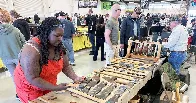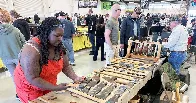U.S. ‘prepper’ culture diversifies amid fear of disaster and political unrest
U.S. ‘prepper’ culture diversifies amid fear of disaster and political unrest

The number of preppers has doubled to about 20 million since 2017 due to more people of color and progressives joining the community, experts say.

getting independent.
so, I have been thinking: preppers often learn how to live independent of industrial production. Maybe the solarpunk movement can learn something from them?
The diversification of prepping was clear last weekend at the Survival & Prepper show at the fairgrounds in Boulder County, a liberal district which President Joe Biden won in 2020 by nearly 57 percentage points over Trump. Over 2,700 people paid $10 each to attend the show, organizers said, and attendees were varied.
Bearded white men with closely cropped hair and heavily tattooed arms were there. But so were hippy moms carrying babies in rainbow colored slings and chatting about canning methods, Latino families looking over greenhouses and water filtration systems, and members of the local Mountain View Fire Rescue team, who in 2021 battled a devastating fire in the region, giving CPR demonstrations and encouraging citizens to be more prepared for extreme events.
“People want to regain their agency, their sense of control, and do something to match their fears to their actions,” said Ellis, who underscored that he did not speak on behalf of the Department of Defense.
People motivated by climate change, Ellis said, tend to be homesteaders who grow their own food and move to more “climate proof” locations, such as the mild summer haven of Duluth, Minnesota.

